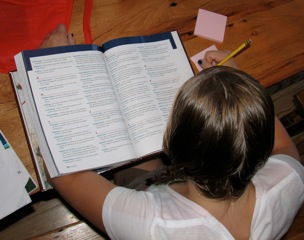Reducing Homework Stress
By Lori Lite
Just say the word homework to most teens, children, or parents and watch their whole mood change as every cell of their mind and body heads into stress mode. Holidays, weekends, and downtime is a great time to have a new look at how you and your children approach homework. Reducing homework stress can turn homework into a positive experience that teaches your child lifelong skills. When homework is too extensive and time consuming it can have a negative impact on your entire family. Stress can get in the way of a child’s ability to learn and retain information. Take a good look at your child’s homework routine. If your child ends up crying, sleep deprived or quitting activities to have more time to complete assignments they may be experiencing stress overload.
 10 Tips: Reducing Homework Stress:
10 Tips: Reducing Homework Stress:
- Purchase a second set of used textbooks to keep at home. This is especially helpful for children that have difficulty juggling assignments and organizing. It is also a healthy choice for your child’s spine. Amazon.com
makes it easy and affordable. - Break it down. Set smaller goals to complete a portion of the assignment. Reward your child with a break. Let your child set a timer to alert them that their break is over. This eliminates power struggles and empowers children.
- Encourage children to review work each night so that when it is time for a test they are not overloaded with information.
- Use affirmations or positive statements like, “I can do it.” This auto-affirmer is a fun way to introduce positive statements.
- Set up an area in your home dedicated to homework and studying. An area clear of chaos makes it easier to focus and feel calm.
- Teach children relaxation techniques. Take a deep breath in and say “Ahhhhh” to release anger and frustration. Stress management should be introduced during calm moments so they can be implemented when needed.
- Have a healthy snack or even a meal before homework. It is difficult to concentrate and feel balanced when hungry or eating sugar. I actually served a full dinner at 3:30 when my kids got off the bus and before they sat down for homework. This adjustment made a huge difference.
- Brain breaks should be taken. Don’t expect children to be able to sit still for long periods of time. Let them move as needed. Blow bubbles outside in the fresh air. Do jumping jacks, run, or have a good laugh. Exercising and deep breathing brings oxygen to your child’s brain and reduces stress.
- Stay positive about and during homework. Children listen and internalize negative statements and movements. A positive hopeful attitude is contagious. If you believe they can do it…they will believe they can do it.
- Help your child understand directions, organize, and create a time management plan. Many children waste time by doing the homework incorrectly because they did not understand the directions. Going over them ahead of time saves time and frustration. Don’t forget your teen. They have more on their plate and could use your guidance and experience.
- Ask your children what type of music helps them to feel more relaxed when they work. Allow them to find what works for them. Indigo Dreams: Kid’s Relaxation Music was created specifically for children. It is relaxing and uplifting. Some children need complete quiet and some do better with background noise. Let them learn what works best for them and honor it.
Even with taking steps to alleviate stress, experts warn that difficult homework assignments and the pressure to complete multiple projects can cause anxiety, frustration, and even anger for kids. Homework that creates an anxiety-ridden child is defeating the overall goal of creating a well-rounded, balanced, successful child. Parents need to step in and get involved if they see this happening to their child. Be an advocate for your child. If they are overwhelmed by homework and it is affecting their quality of life, speak up. You child’s teacher will appreciate your honesty.
Comment







